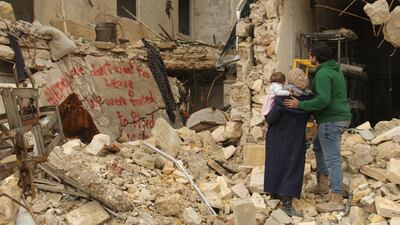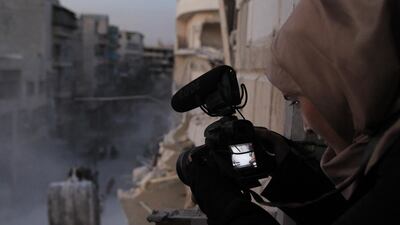It will be difficult to find a piece of work at the Cannes Film Festival that is more emotionally devastating and depressingly timely than Waad Al-Kateab and Edward Watts's award-winning documentary, For Sama. Constructed using footage entirely drawn from an extraordinary archive shot by Kateab in Aleppo over five tumultuous years, the film brings the heartbreaking conflict in Syria, and the resilience and suffering of its people, to the screen with such immediacy and force that you stagger away at the end feeling drained and enraged, but also inspired.
For the directors – they reject being called co-directors in the context of their collaboration – For Sama is a riposte to the distortions that the Bashar Al Assad regime and its supporters have promulgated about the conflict, with catastrophic consequences for people on the ground.
Part of the reason Watts was introduced to Kateab, after she was evacuated from Aleppo in December 2016, he says, when I meet the filmmakers in London, was because he’d been “spending the whole time since the revolution saying to people that I felt the conflict and what was happening was being misrepresented, and that we were falling into the trap laid by the propaganda machines of the regime … I felt, all the time, that people were missing what was actually going on.”
Kateab, who began filming using a mobile phone when it was clear that the peaceful protests she was taking part in with fellow students from the University of Aleppo were being denied by the regime, regards her footage as "very big evidence that the people who are there are Syrians and not, as the regime was saying, all strangers and terrorists."
As an ordinary Syrian citizen, she knew the truth. She knew, too, that “at any moment we could be killed.” So, she began recording as much of what she saw and experienced as possible, hopeful but uncertain that she would still be around to decide later what to do with the footage.
The beginning of the film captures the short-lived optimism of the uprising, when people, Kateab recalls, thought "we could really change not just our lives in Syria, but the whole world". The "regime was criminal", she says, but no one expected Assad to crack down with an ongoing campaign of violence and terror. "Unfortunately, everything went the wrong way."
For Sama is Kateab's fightback, not just for herself, but "for all the people I lost, for all the people killed in Aleppo, and in all other places after us and before us. For me, it's very important to say: 'This is what happened,'" she says.
Watts, who won an International Emmy for the documentary Escape from Isis, was amazed by the breadth of her material. Kateab hadn't just recorded the horrors of life in a city where violent death became commonplace, and Russian airstrikes brought widespread destruction and fear, but also her blossoming romance with a young doctor, Hamza; their wedding, the cosy home where they hoped to build a life together, despite the conflict; her delight at learning she's pregnant with their first child, Sama, and their warm interactions with friends and co-workers.
Light and dark, life and death, it had everything, and the filmmakers found a way to accommodate many shades by using a non-linear approach that gave them more control, says Watts, and stopped the narrative from simply starting in a “happy place” and sliding, chronologically, “into this pit of darkness”. For much of the time, Kateab lived above the emergency room of a hospital Hamza helped set up in east Aleppo after the regime lost control of the area to rebels.
She filmed the injured, the dead and the dying (a lot of them children) who passed through it, and during the six-month siege of the city in 2016, filed unforgettable reports with Channel 4 News in the UK. Versions of two of her most powerful dispatches – about three brothers and a “miracle baby” – offer some of the documentary’s emotional peaks, for opposite reasons. “I was like the hospital staff,” says Kateab. “I used to see these people, I used to engage with them, and I used to expect that myself or Hamza would be like them one day.”
The horror was constant – her dreams became the colour of blood – but it never became routine. “Everything you see, even if you saw bigger before, it still affects you like the first time,” she sighs. Hospitals should have been places of safety, but they were deliberately targeted. Just before Putin’s intervention in the conflict, Kateab and Hamza had made the difficult decision to have a child because although the situation was bad, they couldn’t imagine it getting much worse.
However: "From when the Russians started in September 2015, it was very clear that there were no limits." There had been bombing and massacres before, and ISIS had a brief presence in Aleppo, "but we thought the situation was under control, or it could be controlled … when the Russians came, the balance was very different".
The conflict isn’t a civil war, say the filmmakers. “If it had been, Assad wouldn’t be there and all this wouldn’t have happened,” argues Watts. “It was very insane levels of intervention by outside forces that have allowed this guy to stay where he is.”
Kateab hasn’t forgotten the sound the Russian warplanes made, which was “much scarier than when we’d see the barrel bombs falling.” When she was editing the documentary with Watts at his house in London, the rumble of a nearby Tube train made her suddenly think they were under attack. “It’s my mind,” she says. “It’s not processed anything. I was still feeling that I’m there [in Aleppo].”
Forced into exile with Sama, Hamza, and their then-unborn second child, Taima, Kateab still isn’t ready to let go. “The most difficult thing is that I am happy that I am still there [in my head]. I don’t want to be out of this story.” She reveals that she is trying to recreate her old house using VR. “I don’t know if it’s mad, but I really love that place and really want to stay feeling all my life that we stayed in Aleppo.” Watts is surprised: “That’s the first time you’ve said that,” he offers gently, “and I think it makes a lot of sense.”
She cannot return to Syria while Assad is still in power. In 2014, the security forces had come looking for her, so she adopted the false name Kateab. The day before For Sama was screened for the first time, her parents left Syria, and have no intention of returning.
"I feel a lot of guilt that I am out and I can't do anything for these people," says Kateab pensively. "So, maybe, with this film, I can go to the people, let them watch it, and maybe something will change."
For Sama screens at Cannes Film Festival today


